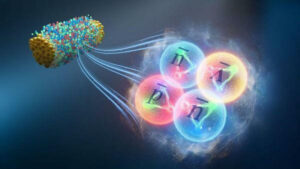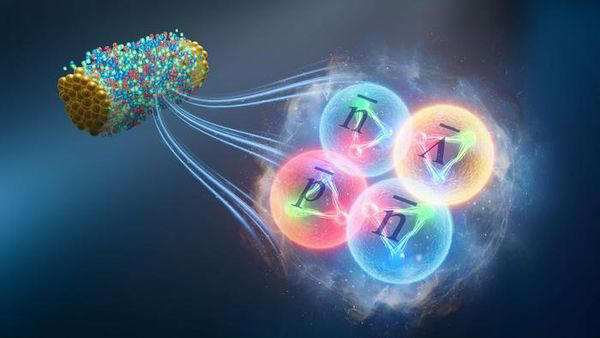The discovery of the heaviest antimatter particle, known as antihyperhydrogen-4, has sparked excitement in the scientific community. This antimatter heavyweight, composed of an antiproton, two antineutrons, and one antihyperon, was detected in a particle accelerator at Brookhaven National Laboratory in New York. The findings, published on August 21 in the journal Nature, have the potential to unlock secrets about the origins of our universe.
The Significance of Antihyperhydrogen-4
Antihyperhydrogen-4 is a remarkable discovery because it represents the most massive antimatter nucleus ever detected. Scientists at the Relativistic Heavy Ion Collider (RHIC) identified this particle by analyzing data from 6 billion collisions. These collisions, designed to simulate a mini-Big Bang, create a plasma soup that mimics the conditions of the early universe.
In the aftermath of the Big Bang, matter and antimatter were produced in equal amounts. However, our universe is predominantly made up of matter, with little antimatter remaining. This imbalance between matter and antimatter is one of the great mysteries of cosmology. By studying antihyperhydrogen-4, physicists hope to uncover differences between matter and antimatter that could explain this cosmic puzzle.

Research Team Revealed
Understanding why our universe is dominated by matter requires delving into the fundamental properties of particles. According to the standard model of cosmology, matter and antimatter should have annihilated each other completely shortly after the Big Bang. Yet, some unknown factor allowed more matter to survive, leading to the universe we observe today. The research team at RHIC used their powerful collider to create conditions similar to those immediately following the Big Bang. By smashing heavy ions together, they produced a fleeting plasma from which primordial particles emerged, combined, and decayed. Among the particles they identified were 16 antihyperhydrogen-4 nuclei.
Physicists found that both hyperhydrogen-4 and its antimatter counterpart, antihyperhydrogen-4, disappeared quickly after being formed. Surprisingly, their lifetimes were nearly identical, suggesting that our current understanding of the symmetry between matter and antimatter holds true. If there had been a significant difference in their lifetimes, it would have required a major revision of existing physics theories.
What’s Next for Antimatter Research?
The next step for scientists is to compare the masses of antihyperhydrogen-4 and its matter counterpart, hyperhydrogen-4. By doing so, they hope to find subtle differences that could shed light on the matter-antimatter imbalance that has puzzled physicists for decades. This research could lead to groundbreaking insights into the fundamental nature of our universe.
The discovery of the heaviest antimatter particle may unlock the secrets of our universe’s origins. By studying antihyperhydrogen-4, scientists are on a quest to understand why our universe is filled with matter rather than antimatter, a mystery that lies at the heart of cosmology.
For further information, visit: https://www.sciencedaily.com/releases
Read our previous articles: https://scitechupdate.com/index.php/researchers-develop-biocomputer-by-linking-16-brain-like-structures-grown-from-human-cells/
https://scitechupdate.com/index.php/breakthrough-material-nasas-grx-810-could-change-everything
https://scitechupdate.com/index.php/big-achievement-first-ever-capture-of-x-ray-image-of-single-atom
https://scitechupdate.com/index.php/china-is-generating-heat-waves-across-the-pacific-ocean
https://scitechupdate.com/index.php/super-material-could-have-more-potential-than-graphene
https://scitechupdate.com/index.php/first-5g-enabled-surgery-performed-by-doctor
https://scitechupdate.com/index.php/two-new-covid-variants-called-flirt-in-the-united-states
First 5G-enabled Surgery performed by Doctor
Hitchhiking Aliens: New Research into Panspermia
Two new COVID variants, called ‘FLiRT’ in the United States
Sex and Gender Studies: Unlocking Equality and Social Justice
https://scitechupdate.com/index.php/social-media-negative-effects-teenagers-brain
https://scitechupdate.com/index.php/japans-co2-absorbing-concrete-home
https://scitechupdate.com/index.php/zinc-should-get-from-food-not-supplements
https://scitechupdate.com/index.php/three-nobel-prizes-try-to-cover-all-of-science
https://scitechupdate.com/index.php/the-most-populated-cities-in-the-world
https://scitechupdate.com/index.php/aromas-and-odors-decoding-the-insect-brains-interpretation
https://scitechupdate.com/index.php/pig-kidney-xenotransplantation-is-thriving-in-human-body
https://scitechupdate.com/index.php/huaweis-new-smartphone-challenger-to-apple
https://scitechupdate.com/index.php/james-webb-telescope-captures-newborn-sun-like-star
https://scitechupdate.com/index.php/oxygen-28-unstable-magic-isotope-that-defies-expectations

